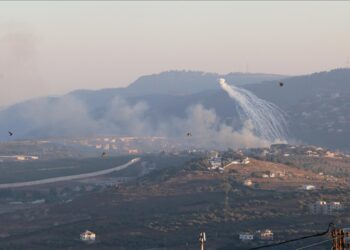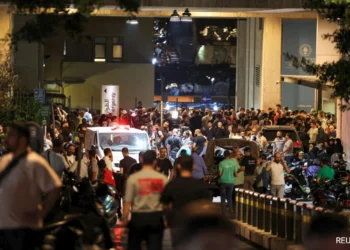Human Lives Human Rights: There is one major difference between the recent repression of Indian Muslims in 2020 and the early 1990s, and that is the role of a foreign actor in these conflicts, none other than Israel.
In many ways, today’s India is fast changing and unrecognizable from what it was just half a decade ago. State repression, criminalization of dissent and attacks on minorities are not new.
Learning from Israel’s attitude towards the Palestinian people and admiring the racist and supremacist moorings of Zionism has been a long-standing feature of Hindutva, a Hindu supremacist ideology subscribed by the ruling Bharatiya Janata Party (BJP), which is now playing itself out.
India-Israel relations began at the same time, when there was a peak of extremist Hindu attacks on Muslims in 1992. With Narendra Modi coming to power, these relationships have become even stronger. In fact, Narendra Modi is the first Indian Prime Minister to travel to the Occupied Palestinian Territories.
Interestingly, both the governments of India and Israel, especially that of former Benjamin Netanyahu’s right-wing Likud party, have an ideology of racial superiority and religious extremism.
Another common point of the governments of India and Israel is that they both face resistance, India from the Muslims in Kashmir and Israel from the Palestine.
Many analysts in this regard believe that the actions of the Indian government in the last one or two years to suppress the Muslim people of Kashmir were architected by the Zionists. Israel has supported India’s actions in Kashmir, calling it purely an internal matter.
In fact, it seems that Israel is always looking for allies who, like the Modi government, are at odds with Muslims and are suppressing them, because this could be a common point in Tel Aviv and such governments.
In other words, just as Israel seeks ethnic cleansing, demographic change of the Occupied Territories through policies such as settlements for its citizens, the demolition of homes and the displacement of Palestinian Muslims, similar policies are encouraged, theorized and even pursued by the Indian government such as granting citizenship to non-Muslim foreigners and revoking the citizenship of Indian Muslims.
In fact, through such actions, Tel Aviv wants to instill in the sense of public opinion that it is not the only regime that seeks to implement such policies, rather, other governments, such as India and even Turkey, which have suppressed the Muslims of Kashmir, Armenia and Kurds for decades, have followed suit.
The mysterious politics and a double air roof of Tel Aviv stems from the fact that it has a double standard in the face of the same events as the independence of the people of Kashmir and Iraqi Kurdistan.
This regime opposes the independence of Kashmir and considers it an internal matter for India to legitimize the joint repression of the Muslims of Palestine and Kashmir by itself and its allied government in New Delhi.
Documents that show the Indian government’s responsibility towards Muslims
It may apparently seem okay that the Indian government does not interfere in the repression of its Muslim citizens by extremist Hindus, but there is a lot of evidence to the contrary.
International laws that India has failed to follow
The 1969 Vienna Convention on the Law of Treaties, which is an authoritative treaty, explicitly prohibits racial discrimination. Similarly, the 1961 Convention on the Reduction of Statelessness also explicitly prohibits states from revoking the citizenship of their nationals.
According to the clause 1 and 2 of Article 15 of the Universal Declaration of Human Rights, Everyone has the right to a nationality and no one shall be arbitrarily deprived of his nationality nor denied the right to change his nationality.
In a similar way, the doctrine of responsibility to protection (R2P), adopted by the UN General Assembly in 2005, in a broader interpretation of the concept of sovereignty, affirmed the notion that sovereignty is not just protection from outside interference – rather is a matter of states having positive responsibilities for their population’s welfare, and to assist each other and that if the State was unwilling or unable to do so, the responsibility shifted to the international community to use diplomatic, humanitarian and other means to protect them.
Consequently, the primary responsibility for the protection of its people rested first and foremost with the State itself, to fulfil its responsibility to protect, otherwise, it itself is the actual perpetrator of crimes or atrocities.
Accordingly, Articles 3 and 5 of the Universal Declaration of Human Rights state that everyone has the right to life, liberty and security of person and that no one shall be subjected to torture or to cruel, inhuman or degrading treatment or punishment.
Other documents include the Hague Conventions of 1899 and 1907, which state that the commission of multiple violations of human rights and/or international humanitarian law, may constitute crimes against humanity or war crimes, and often both at the same time.
Articles 34 of the 1949 Geneva Convention IV, explicitly prohibits acts such as collective punishment, looting, retaliation against individuals, and civilian property.
So, has India been really working on them, especially when it comes to the Muslims of this country. The burning of mosques, lynching of Muslims, forcing Muslims to drink urine, eat cow-dung, hijab controversies and what not. Doesn’t it seem the violation that has in the past few years is being directed by the Apartheid regime of Israel?


















